
Main Page
Alphabetical Menu
Chronological Menu
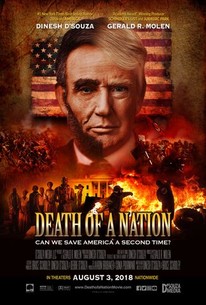 Death of a Nation, co-directed by Dinesh D'Souza and Bruce Schooley, is a provocative documentary that covers a lot of historical ground, but is often unfocused with too many generalizations, oversimplifications, and a very weak central thesis comparing Donald Trump to Abraham Lincoln. The filmmakers define fascism and explain how fascism was actually part of the left-wing of politics. FDR, for instance, was infatuated with Mussoli. Hitler was sympathatic toward progressives and democrats. Democrats believe in what the Nazis "Gleichschaltung," enforced monopoly of opinions, and want to take fruits of citizens' labor while Republicans want citizens to keep their fruits of labor. Then there's the argument that Trump isn't a fascist because he believes in free speech, freedom of the press, and believes in capitalism instead of corporatism. Trump believes in freedom of speech and freedom of the press?? What??? Well, in that case, the Pope is Jewish! The filmmakers also posit that there are essentially two big lies coming from the Democratic Party: The Big Lie of Fascism and the Big Lie of Racism. The meaning of fascism has become muddled, "national" has been removed from "national socialism" and, with the help of the media, fascism was moved to the right instead of the left because American progressives panicked because they didn't want to be associated with Nazi fascism. When it comes to racism, our Founding Fathers were against slavery and even tried to stop slave trade; the plantation system was a part of the Democratic Party. Guess who passed segregation laws? Democrats. The KKK originated in the Democratic Party and experienced a rebirth after watching the D.W. Griffith film The Birth of a Nation. According to the filmmakers, Democrats are the real racists and Trump has Lincoln's innate strength, but just needs the Republican Party support him. What if they don't want to support him? Death of a Nation doesn't mention how Trump ought to change. What if Trump needs to change his policies and behavior in order for them to support him? Sure, he's no choir boy, but he's far from a role model for American citizens, doesn't behave like a rational, mentally stable human being, and hasn't learned to stop embarrassing himself and America with his many Tweets. If there were a mandatory mental health examination for all U.S. Presidents prior to their first day in office, it wouldn't be surprising if Trump would've flunked the exam.
To be fair, D'Souza and Schooley are entitled to their opinions and perspectives. What they lack, though, is a thorough, profound debate of each of their points/conclusions. Someone who worked for the Bush administration once wisely told me that there are are more than two sides to every coin: there's the sides of the coin, the ridges, the edge of the ridges and so on. Nothing is really black-and-white like Death of a Nation makes politics and history out to be. Neither history nor politics is merely a two-sided coin. Moreover, the filmmakers don't include enough balance of perspectives to their arguments. Naomi Wolf, author of The End of America, for example, could've provided some great counterpoints and insights. The same goes for Noam Chomsky. When D'Souza interviews Richard Spencer, a member of the "alt right", he barely gives him the chance to speak, and the way that he asks him questions sound very leading. Spencer states that political parties are merely a vessel, but D'Souza doesn't ask him to elaborate on that very interesting point. If they were to have a conversation, which is something that's becoming increasingly rare these days, Death of a Nation would've been for more illuminating. Unfortunately, the film remains too myopic, fear-inducing and anger-inducing. It might change the way you look at fascism, but it won't change the way you look at Trump. Quality Flix opens Death of a Nation nationwide.
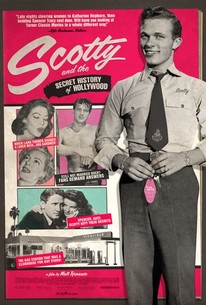
Scotty and the Secret History of Hollywood is an irresistibly entertaining documentary about the Scotty Bowers, a former Marine who worked at a gas station where he procured sex partners for closeted lesbian, gay and bi Hollywood stars of the Golden Age. Bowers explains how he ended up being a pimp after he met Walter Pigeon. Director Matt Tyrnauer doesn't shy away from providing you with the juicy details about the sex life of famous people from the Golden Age, including royalty, but the real meat of this doc comes from the exploration of Scotty Bowers life. A great documentary has a great subject. Scotty comes across as very blunt, intelligent, stubborn and deeply troubled. He was sexually abused as a child, but denies that it was traumatic. Tynauer doesn't pass judgement on him even when he shows you evidence of his hoarding problem. You also get to meet Scotty's second wife, Lois, and his cats. The best moment in Scotty and the Secret History of Hollywood is when someone shows up to Scotty's book signing at a store and complains about how distasteful and wrong it is for him to expose the gay and lesbian sexual lives of Hollywood stars. Scotty replies to him by asking him a good question that silences him, "What's wrong with being gay??" Bravo to Scotty for standing up for what he believes in and for not giving into bigotry. The more you get to know him, the more flawed he is as a human being despite that he seems happy. Even at the age of 91, he's still full of joie de vivre. At a running time of 97 minutes, Scotty and the Secret History of Hollywood is a well-edited, captivating, and illuminating warts-and-all documentary. It opens at IFC Center via Greenwhich Entertainment. Along with the Gods: The Last 49 Days 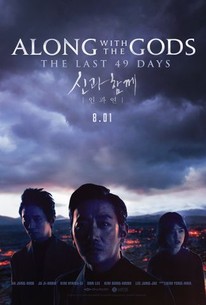
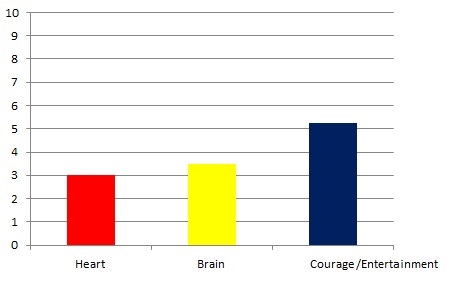 Christopher Robin 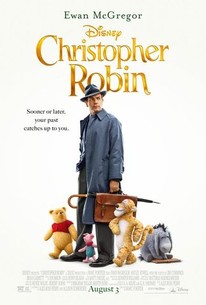 On the verge of entering boarding school, young Christopher Robin (Orton O'Brien) bids farewell to the friends whom he had befriended in a Hundred Acre Wood through his childhood: Piglet (voice of Nick Mohammed), Eeyore (voice of Brad Garrett), Rabbit (voice of Peter Capaldi), Roo (voice of Sara Sheen), Kanga (voice of Sophie Okonedo), Owl (voice of Toby Jones), Tigger (voice of Jim Cummings), and, of course, Winnie the Pooh (voice of Jim Cummings). Decades later, Chistopher (now played by Ewan McGregor) lives with his wife, Evelyn (Hayley Atwell), and daughter, Madeline (Bronte Carmichael), who happens to 9-years-old, the same age that Christopher was when he departed the Hundred Acre Wood. He's forgotten about his childhood friend as well as how to be joyful. Instead, he focuses on his job as an efficiency manager at Winslow Luggage, a luggage manufacturer, while neglecting his family. His job remains on the line as his boss, Giles (Mark Gatiss), threatens to fire him and his colleagues unless they can come up with a way to cut costs for the company. Christopher Robin is a charming, tender and sporadically funny film that gets better as it goes along. The screenplay by Alex Ross Perry, Tom McCarthy and Allison Schroeder rushes through the first act as it assumes you already know that Christopher had bonded with his childhood friends. Then it skips over his life at boarding school and leaves you smack in the middle of a crisis that he struggle with with his work and family. The way that Pooh magically leaves Hundred Acre Wood and ends up in London feels rushed as well, especially how he just so happens to bump into Christopher on a park bench. Putting those contrivances and rushed scenes aside, there's a genuine poignancy to the relationship between Pooh and Christopher, and it's equally moving to observe how they affect one another. One caveat: I'm not a huge fan of Ewan McGregor because I don't think he has much charisma. He does give a decent performance here, but the lack of charisma makes Christopher Robin seem bland and emotionally flat as character. He doesn't shine as brightly as his CGI-animated childhood friends. On an asthetic level, the CGI animation is seamlessly blended into the live action. You'll forget that you're watching CGI. The colors look a bit drained and washed out giving the film a somewhat somber tone. When the comedic elements pick up, they're a breath of fresh air, although the predominantly slapstick humor seems to be geared toward kids, mostly. It would've been great to have at least some humor for adults, but, to be fair it's not easy to find that balance like director Marc Forster did so deftly in Finding Neverland. Also, the film does get a bit preachy toward the end. Christopher Robin doesn't quite reach the emotional heights of that classic nor does it feel as exhilarating, but at least it's a mildly diverting and harmless slice of family entertainment. 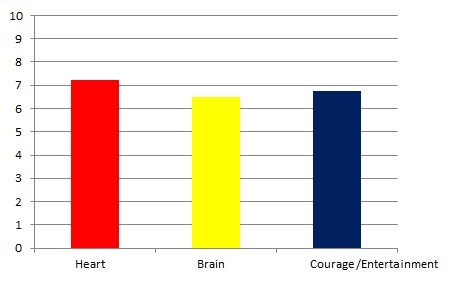 Gavagai 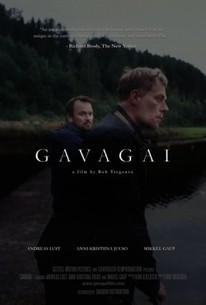 Carsten Neuer (Andreas Lust), a recently widowed man, travels to Norway to finish translating Norwegian poems into Chinese, a project that he had worked on with his wife. He hires a tour guide, Niko Haapasalo (Mikkel Gaup), to drive him through the Norwegian countryside. Niko has a troubled relationship with his girlfriend, Mari Dahl (Anni-Kristiina Juuso), who announces to him that she's pregnant, much to his dismay. Meanwhile, the ghost of Carsten's wife haunts him. To label Gavagai as a road trip movie or to describe its plot for that matter wouldn't do it any justice because it's fundamentally an emotional, spiritual journey that's beyond words. It's about grief, life and death with some magical realism. Carsten and Niko initually seem like they have very little in common: Carsten's wife recently died; Niko's girlfriend is about to have a baby. The way that they find common ground and relate to one another is shown in a simply complex, yet profoundly human scene where they laugh together. The screenplay by writer/director Rob Tregenza and co-writer Kirk Kjeldsen is filled with subtlety, nuance and metaphors. The most powerful moments are the quiet moments. Carsten comes across as taciturn more often than not which makes him all the more interesting because you're often wondering what he's thinking and feeling. Andreas Lust gives a convincingly moving performance that gets to the core of Carsten's emotional truth. He physically resembles Robert Redford who also had many moments of silence in All is Lost. Lust, like Redford, knows how to convey emotions in a naturalistic way while providing you with a glimpse into the soul and inner life of Carsten. Fortunately, Tregenza is not the kind of filmmaker who spoon-feeds audiences with exposition. You don't learn how Carsten's wife died nor are there any flashbacks to their life together. When Niko introduces Carsten to his girlfriend, you don't get to hear their conversation, but you can interpret their body language. A less talented filmmaker would've included a lot more exposition, flashbacks and narration filled with over-explaining thereby leaving no room for interpretation. Bravo to Tregenza for boldly trusting the audience's patience, imagination, intellegence and emotions. He moves the film at a eisurely pace thereby allowing you to fully absorb the poetic visuals. Gavagai images and musical score speak much louder than words. Even when there's no dialogue, there's always something interesting to observe onscreen. A scene by a lake with the sound of a bonfire crackling is mesmerzing in a way that can't be adequetly described. You can actually feel the warmth of that bonfire. It would be ideal to watch Gavagai on the big screen to maximize the power of its sights and sounds. When it comes to pacing, lyricism, depth of emotions and how nature becomes a character in itself, much of Gavagai feels reminiscent of Tarkovosky's The Sacrifice as well as the films of Carlos Reygadas and Ingmar Bergman. It has a perfect balance of Truth and Spectacle. "Where is the Spectacle?" you might ask. You'll find it beneath its Truth in the form of humanism, the best kind of Spectacle. There are no gun battles, car chases or even a flat tire to be found here; just the Spectacle of life itself in all of its deceptively simple complexity. At a running time 83 minutes, Gavagai is a mesmerizing, quietly powerful and provocative emotional journey brimming with warmth, tenderness and breathtaking imagery. 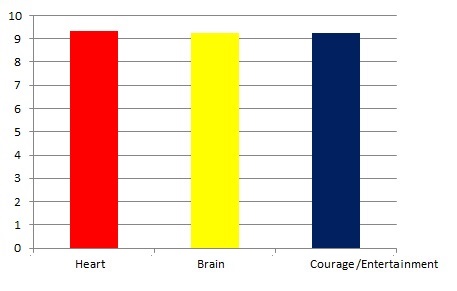 Never Goin' Back 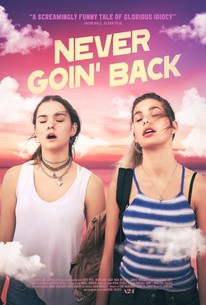 Angela (Maia Mitchell) and her best friend, Jessie (Camila Morrone), work as waitresses at diner while struggling to make ends meet. They live together in a house in Texas with Brandon (Kyle Mooney) and Dustin (Joel Allen), a drug dealer, and dream of escaping their boring lives to eat donuts on the beaches of Galveston. Never Goin' Back is a dumb, aimless film about dumb, aimless characters. Imagine going to a party where you meet obnoxious, shallow and boring people who you can't stand to be around and hope to never meet again. Undergoing that kind of an experience is what it feels like to watch Never Goin' Back. The screenplay by writer/director Augustine Frizzell lacks warmth, intelligence and pathos. The humor ranges from lowbrow, toilet humor to irreverent humor, but without much in terms of wit. Case in point: when Angela goes on a long, mean-spirited rant against an elderly man and his wife at a supermarket after he caught her stealing some food. Is that the way her parents raised her? Frizzelli doesn't even bother to introduce you to Angela or Jessie's parents. The only remotely funny scene involves a police officer who makes some gay jokes, but the jokes outstay they welcome. Watching Angela and Jessie vomit on their manager at the diner is disgusting and yet another example of how lazy and juvenile Never Goin' Back is. A projectionist once wisely told Gene Siskel that if nothing happens during the first reel (20 minutes) of a film, the chances are that nothing will happen during the rest of the film. In the case of this particular film, he stands correct. Although it's acceptable for there to be a wafer-thin plot, there should be at least something along the lines of character development or genuine feelings within the plot to compensate. None of those elements can be found here. Even the lazy, silly ending leaves you feeling underwhelmed. Moreover Angela and Jessie have no character arc and have very little chemistry together. They're certainly no Enid and Rebecca or Romy and Michelle. With a wiser, more heartfelt and biting screenplay, Never Goin' Back could've been something along the lines of Dazed and Confused, Ghost World or Funny Ha Ha instead of being a vapid bore. It makes Harold and Kumar Go to White Castle look like a masterpiece. Even the upcoming film Support the Girls is superior to it. Never Goin' Back ultimately overstays its welcome at a running time of 83 minutes which feels more like 3 hours. 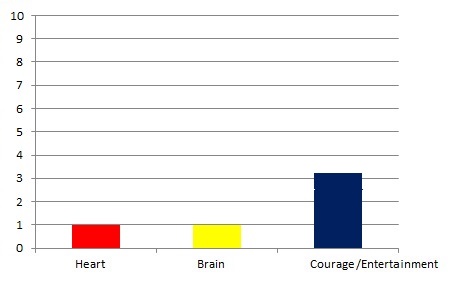 Night Comes On 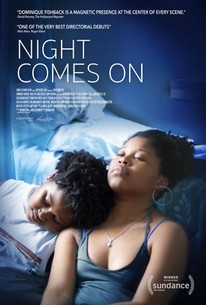 18-year-old Angel Lamere (Dominique Fishback) has just been released from a juvenile detention center. She hopes to reunite to with her friend, Maya (Cymbal Byrd), to find her father and to buy a gun to avenge the murder of her mother. Her motivations for revenge evolve when she meets her 10-year-old sister, Abby (Tatum Marilyn Hall), who's living in foster care. Night Comes On is a genuinely heartfelt drama with a hint of slow-burning thriller elements. Writer/director Jordana Spiro and co-writer Angelica Nwandu wisely keep the film character-driven while grounding it in realism. Thanks to the sensitively-written screenplay, Night Comes On feels like an unflinching slice-of-life that doesn't rely on cheap thrills or unnecessary subplots to entertain. Angel and Abby both seem like lived-in characters rather than caricatures. Their bond as sibling is palpable, and it's both poignant and captivating to watch their relationship blossom. Yes, Angel has flaws and isn't entirely likable, especially when it comes to her choice of using violence to avenge her mother's death, but that makes her all the more interesting as a character. Moreover, the filmmakers treat Angel compassionately as a human being without judging her. They also do a great job of balancing the film's light and dark elements. It's gritty and somber most of the time, but there are glimmers of hope throughout and even some well-incorporated levity along with a final scene set in a location that can be seen as a metaphor à la the metaphor in The 400 Blows's final scene. Bravo to the filmmakers for finding an ending that's understated, poignant and refreshingly un-Hollywood. The majority of Night Comes On's heart and soul comes from the raw, breakthrough performance by Dominique Fishback. She's a very talented actress who gives a natural performance without over-acting. At times, you might even find yourself forgetting that you're watching someone act. Every scene in Night Comes On rings true and there's not a single lethargic moment to be found. At an ideal running time of 90 minutes, it's an unflinching, understated and tender drama. If dramas were ruling the box office like they used to back in the 80's and 90's, Night Comes On would've easily been a much wider release. It would make for a great double feature with Who We Are Now and The 400 Blows. 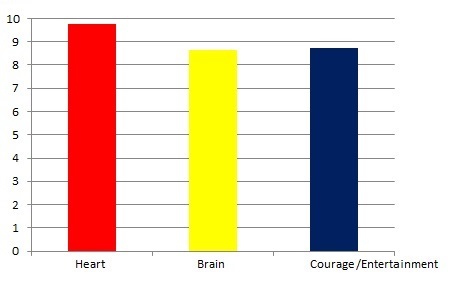 The Spy Who Dumped Me 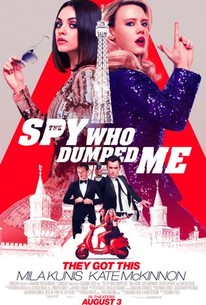
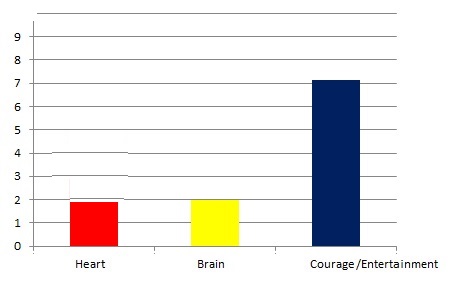 Main Page Alphabetical Menu Chronological Menu ______________________________________________________ |
The NYC Movie Guru
themovieguru101@yahoo.com
Privacy Policy